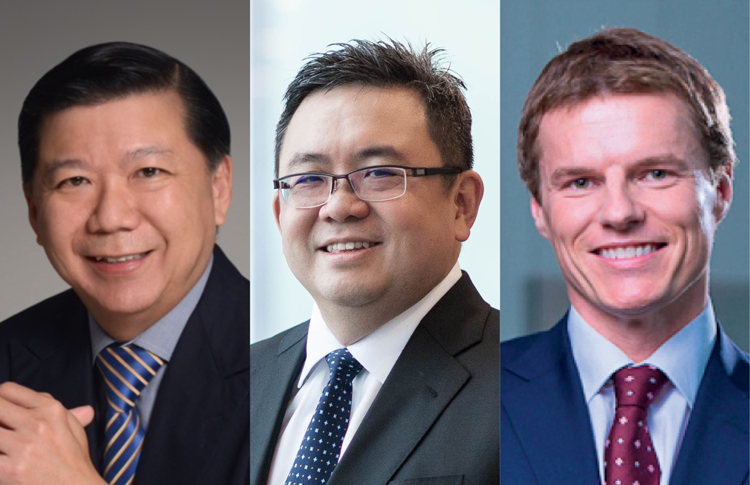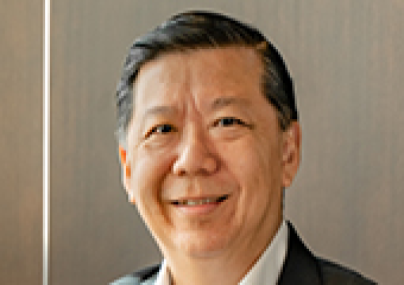
With a most unique year winding to a close, law firm leaders in Singapore look back on some of the lessons they learnt, and also the ways they put both clients and employees in focus during a difficult time.
In what major aspects have you seen the pandemic impact the firm and its work to date?
PATRICK ANG, managing partner, Rajah & Tann Singapore: Prior to the COVID-19 pandemic, the firm had just moved to our new premises at Marina One. Over the years, we had upgraded our use of technology and applications and started a transition to a less-paper office. We had in our management discussions talked about a more flexible work arrangement and in 2020, started permitting our lawyers to work from home on a very limited basis. No one could have foreseen that just a few weeks after, the entire firm would be working from home as the default position.
The pandemic’s impact on our work environment has been swift. It has accelerated our longer-term plans for a more flexible work arrangement. For example, all of us have quickly adapted the use of Zoom for meetings, and the use of multiple screens to carry out our work (instead of paper bundles). We have adopted more applications for our office processes such as approval of payments, instead of paper forms. Some of our lawyers have even told me that they were surprised that they managed to get their work done with less paper than before or at all.
This crisis has also presented our lawyers and staff the unique opportunity to innovate and expand the remote working capabilities of the firm both in Singapore and also regionally in, Cambodia, China, Indonesia, Laos, Malaysia, Myanmar, Philippines, Thailand and Vietnam where we operate.
JERRY KOH, joint managing partner, Allen & Gledhill: We have had to make significant adjustments to the way we work and interact within Allen & Gledhill and with our clients. As COVID-19 is highly contagious, we spared no effort to ensure the safety and wellbeing of our people, who are our most important asset.
Technology was one of the tools which we lever-aged on to continue our operations as close as possible to pre-COVID days. Video conferencing and regular virtual catchups have enabled us to keep in touch with one another within our firm and to maintain our relationships with clients.
Supporting our clients through this period has been a top priority for us and we made a concerted effort to ensure that we are in constant communication with them by reaching out to them through emails, calls, webinars and even virtual social gatherings. Furthermore, we have also established an online COVID-19 Resource Centre and a cross-disciplinary Legal Task Force to address any questions relating to the legal impact of COVID-19 on the business of our clients.
“From the outset of the pandemic, our focus has been to protect employees, meet our clients’ needs and keep the wider firm fully operational. Internally, we implemented work-from-home setups and flexible working arrangements. The speed and efficiency at which this was carried out by our group IT and business continuity teams was exceptional, and we have been able to maintain our service and productivity levels throughout.”
— Anthony McKenzie, Carey Olsen
ANTHONY MCKENZIE, Singapore managing partner, Carey Olsen: The pandemic has tested the ability of law firms to respond to crises and has exposed inefficiencies in a number of law firms’ traditional ways of working. As a result, the legal services industry as a whole is undergoing significant adaptation – remote working, alongside fewer opportunities to interact face-to-face, has led to significant changes in the way organisations conduct their business, and law firms increasingly need to be aware of clients’ changing expectations in order to integrate them into their strategy going forward.
From the outset of the pandemic, our focus has been to protect employees, meet our clients’ needs and keep the wider firm fully operational. Internally, we implemented work-from-home setups and flexible working arrangements. The speed and efficiency at which this was carried out by our group IT and business continuity teams was exceptional, and we have been able to maintain our service and productivity levels throughout. We were fortunate that pre-COVID Carey Olsen had invested time, energy and money into expanding our IT presence and capability so that when the pandemic hit we were already comfortable with remote working.
Like the adoption of remote working, the move to customer-centric legal service delivery will be even more rapid now and all law firms need to ensure they are redesigning their businesses around the needs of their clients. We have adapted our client development strategy away from in-person meetings to delivering informed and relevant commentary to our clients via virtual meetings, collaborative webinar sessions, electronic client briefings, online courses and one-to-one online training with key clients and contacts.
The pandemic has not changed the need for some of our clients to litigate disputes in the offshore courts. These courts have sought to remain active mainly via the use of remote hearings (telephone and video/hybrid). Our Singapore office has been involved in several virtual hearings through Zoom in both the Cayman and BVI courts, where hearings would ordinarily be heard in person by way of oral hearing. The lockdown measures imposed due to the pandemic have also forced a re-think of document execution practices. Social distancing measures meant that e-signatures and virtual executions (where signatories are not all present in the same place) became the norm.
Beyond the way business is conducted, the pandemic has naturally affected the type of legal work offshore firms are actually doing. Global M&A activity ground to a halt early in 2020, with the start of the year seeing the slowest rate of deal-making in several years. More recently, however, we have seen a resurgence of Asian M&A, refinancing and IPO activity and promoter-led take-private deals, buoyed in some markets by elevated geopolitical tensions. We have also seen a significant increase in enquiries and instructions relating to distressed assets, structures and businesses. As a result, we continue to invest in our Singapore and wider Asian restructuring and insolvency practice as businesses deal with the aftermath of the pandemic.
With employees generally working from home, how have you looked to balance productivity with employee morale and wellbeing? What are some lessons you will take for the future when it comes to employee engagement going forward?
ANG: Rajah & Tann thrives on a people-centric philosophy. We believe that human capital is essential to our ability to deliver services to clients and we adhere unwaveringly to our values of treating our people as our most valuable resource.
In the past months, we have ensured that we step up our interpersonal interactions and engagements through organising more regular virtual meetings, trainings and team bonding events among the various working teams within the firm and also across our regional offices.
The Rajah & Tann Asia Academy that was launched in 2019 has also rolled out a series of virtual regional training sessions during this period, focused on enhancing our talent pool with professional skills and knowledge training. This year, we conducted our inaugural regional live-streaming training with participative and interactive elements on soft skills conducted by external trainers was done across eight countries.
We also conducted training for our regional management team by Zoom. Attendance at these sessions were very good. Through training and interaction with our colleagues from across jurisdictions, we believe we can emerge stronger as a legal network when the crisis is over.
KOH: The pandemic has taught us that communication, resilience and innovation go a long way in dealing with a crisis. Many of us were faced with the challenges of working from home such as managing our work duties and other responsibilities of caring for our aged parents or young children. Some of us felt that the line between work and personal time were blurred during this period.
One of the ways to counteract this was through regular communications to staff and providing them with constant updates on the situation. We set out clear plans on how our firm is navigating through the pandemic as well as provide useful tips on how to build resilience and combat stress during this period. Our HR department also organised virtual events, such as Pilates classes, to encourage a healthy lifestyle while working from home. On a more organic level, some of our departments took the initiative to hold virtual lunch and drink sessions, which allowed for their teams to stay connected. We have also maintained our culture of encouraging and helping one another during this difficult period, which has helped to lift up spirits and boost morale. Furthermore, we made sure that there were open communication lines and appropriate resources available for staff to turn to, should they require any assistance.
All of these initiatives have helped us to stay the course, keep morale up, and overcome mental and emotional fatigue as we adjust to this new normal.
MCKENZIE: Our staff are, and will continue to be, Carey Olsen’s most valuable assets. In Singapore, we have recently commenced a phased reopening of our office with our staff split into two groups, with each allowed to go into the office on alternative weeks. As such, there has been an ongoing focus on making our office secure and safe for staff returning to work, but we have always sought to prioritise the wellbeing and mental health of our staff. Some may find it difficult returning to the office and require additional support. Others may still be working from home, feel isolated from the wider team and find that the divide between work and home life has become blurred. Employee engagement and trying to keep a sense of humour about things has been key to making sure our staff have felt connected, supported and motivated during these times. We now share more financial performance metrics across the office and note trends, challenges and areas for improvement. We’ve tried to give employees as much comfort as we can and are open on how the wider firm is performing. We send pandemic care packages to staff, have regular office (and department) catch-up coffees and hold informal quiz sessions with new joiners about themselves and Carey Olsen. These things have helped with communication and feeling part of a team.
A key lesson from this period is the importance of listening to your team, sense-checking what’s working and what isn’t and being agile enough to change approaches so that our office productivity, morale and culture is maintained.
Companies today are facing a challenging period and having to make difficult decisions. What are the ways you feel that you as their legal counsel are able to help them during this time?
ANG: At a time like this, proactive engagement is even more crucial than before. As the business plans and priorities of our clients shift, we should also be ready to pivot our client-service agenda to complement what our clients require.
“We understand that many companies are extremely price-sensitive during this period. As client demands for lower costs persist, for law firms to continue to be relevant, we have to examine how we can redesign and revalue our legal deliverables and come up with new service delivery models and multi-disciplinary offerings that will bring value and cost savings to our clients.”
— Patrick Ang, Rajah & Tann
At Rajah & Tann, we stay close to our clients, listen to their needs and remain on a constant lookout for new and improved ways of meeting these needs.
We also understand that many companies are extremely price-sensitive during this period. As client demands for lower costs persist, for law firms to continue to be relevant, we have to examine how we can redesign and revalue our legal deliverables and come up with new service delivery models and multi-disciplinary offerings that will bring value and cost savings to our clients.
Amidst the pandemic, we have since launched a number of solutions for our clients to help them to cope better with accelerated digitalisation of their businesses and industries:
Launch of Lupl – We have come together with law firms CMS in Europe and Cooley in the US, to support the development of Lupl, the world’s first open industry platform for legal matters. With COVID-19 turbocharging the shift to real-time communications tools, the demand for instant interactions has greatly increased. Lupl aims to synchronise everything that goes into a legal matter - whether it is people, documents, information, communications or tech applications - into a single secure space.
Launch of Rajah & Tann ReadyDocs – This is a platform that enables our clients to remotely create, edit, digitally sign and manage Rajah & Tann quality contracts from any device at any time. The platform operates on a subscription-based pricing model with no hidden fees. This empowers SME owners and startup founders to spend less time dealing with contracts and more time on running their business with the security that all documents generated on the platform come with the quality assurance of Rajah & Tann.
Launch of Rajah & Tann Cybersecurity (RTCyber) - With the accelerated use of online platforms and home-based work activities, cyber-attacks are no longer confined to corporate websites and accounts. RTCyber is a first-of-its-kind one-stop-shop solution that integrates legal and cybersecurity expertise under one roof.
“We recognised that our clients would require integrated solutions that were quick, informative and specific to the issues that they face. Hence, we proactively implemented several new initiatives aimed at helping them to address these multi-dimensional issues. One such initiative was the establishment of our Covid-19 Task Force, which allows our clients to email us directly if they have any questions.”
— Jerry Koh, Allen & Gledhill
KOH: One of the scenarios we planned for was the likely situation that our clients would come to us with legal queries related to the policy changes implemented by the government during the pandemic. We also foresaw that these queries would be complex and may touch on multiple practice areas such as public policy, contracts and employment.
We recognised that our clients would require integrated solutions that were quick, informative and specific to the issues that they face. Hence, we proactively implemented several new initiatives aimed at helping them to address these multi-dimensional issues.
One such initiative was the establishment of our COVID-19 Task Force, which allows our clients to email us directly if they have any questions related to navigating the legal landscape during this period. Our task force comprises top Partners across our various practice areas, who will then tailor their legal advice to our client’s needs. On top of this, we have also set up our COVID-19 Resource Centre on our website which contains relevant articles and information on potential issues that would be helpful to our clients during this time. We have also been conducting webinars on relevant topics which allowed us to share with our clients various practical legal solutions to address and mini-mise the impact of COVID-19 on their businesses.
Our efforts have been well received by our clients, and many have written to us mentioning that they appreciate how we were able to rapidly provide them with relevant and holistic legal advice that catered to their situation.
MCKENZIE: Just as clients are adapting to changes due to the pandemic, law firms, in turn, need to adapt to the changing needs of their clients. It is essential to strike the right balance between having an open, flexible approach to communications with our clients using new technology while also having a secure and pragmatic approach to conducting safe in-person client meetings where necessary. At the same time, our clients continue to want a clear and transparent billing relationship with their lawyers which during this challenging period often requires flexible fee arrangements in managing their budget.
Captive clients don’t exist anymore – a client works with us because we have the trusted advisors, required expertise and fee structure that align with the added value that it is seeking. They need to know that we are available for them when they need us, that we give them good advice and that we can solve their legal problems.
Law firms with strong knowledge of their clients’ businesses will be better placed to weather the pandemic and react quickly. As such, our emphasis during the pandemic has been on solidifying one-on-one relationships with our key clients in order to better understand their business and strategic needs. We do this through increased personal interactions with clients (such as picking up the phone and calling them), issuing bespoke legal updates, and hosting client-specific seminars and training sessions.
To contact the editorial team, please email ALBEditor@thomsonreuters.com.

